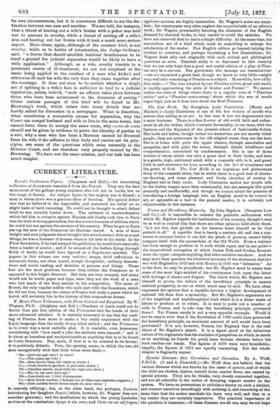France and Hereditary Monarchy. By John Bigelow. (Sampson Low and
Co.)—It is impossible to censure the patriotic enthusiasm with which Mr. Bigelow regards the institutions of his country, though it may be as well to remind him that there are other opinions held about them. "Lot not him that girdeth on his harness boast himself as he that putteth it off." A republic that is barely a century old and has a con- tinent to exhaust before it can feel the pinch of poverty, cannot fairly compare itself with the monarchies of the Old World. Even a century has been enough to produce in it evils which equal, and in one point— the unparalleled corruption of which James Fisk and Gordon Bennett were the types—surpass anything that older societies can show. And we may more than question the historical accuracy of the statement that the war with England in 1812 and with Mexico in 1817 was "defensive." As to the first, we may be prejudiced ; but Mr. Bigelow must be aware that some of the most high-minded of his countrymen look upon the latter with feelings of shame and disgust. Tho thesis which Mr. Bigelow sets himself to prove, the failure of the hereditary principle to ensure national prosperity, is one on which much may be said. We have often expressed the opinion that a republic favours a higher development of national life than does a monarchy. But Mr. Bigelow's arguments are of the empirical and unphilosophical kind which it is a sheer waste of labour to produce or to refute. It is easy to point out a number of evils in France, and to ask—has the hereditary principle prevented these ? Yet France surely is not a very apposite example. Would it not be easy to aver that if the Revolution of 1789 could have preserved the hereditary principle, an enormous amount of evil would have been prevented? It is not, however, France, but England that is the real object of Mr. Bigelow's attack. It is a signal proof of the fallacious nature of his arguments that the statistics of pauperism on which, as much as on anything, he founds his proof, have become obsolete before his book reaches our hands. The figures of 1870 were very formidable ; happily, the figures of 1872 are equally reassuring. But the whole chapter is flagrantly unjust.


































 Previous page
Previous page